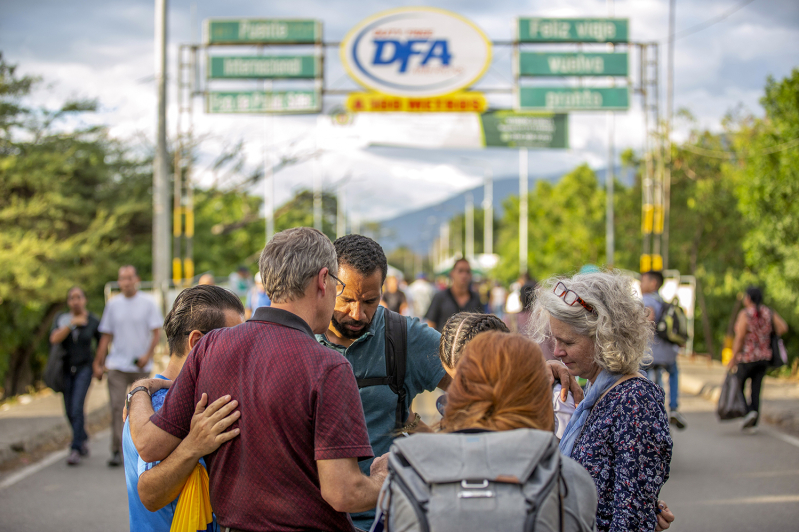
The largest share of migrants worldwide are Christians, the country of origin for the highest number of Christian migrants is Mexico (11.3 Million or 9%), and Christian migrants' destination country of choice is the USA followed by Germany and Russia, according to latest Pew Research Center data, published on August 19. The findings reinforce the importance of migration and diaspora ministry, an issue that will likely get attention at the upcoming Lausanne Congress in Seoul next month.
Data showed that adherents of Christianity comprise a “larger share” of migrants at 47 percent, when comparing it to their percentage of the world’s population overall (30%).
Pew Research Center analyzed data from the United Nations, alongside 270 censuses and surveys for its report, up to 2020, the latest year for available global figures.
“Migration has grown steadily in recent decades,” wrote the report’s authors, Stephanie Kramer and Yunping Tong. “Today, more than 280 million people, or 3.6% of the world’s population, are international migrants – meaning they live outside their country of birth.”
Kramer and Tong said people moved internationally for many reasons, such as finding work, education or joining family members. However, religion and migration are “often closely connected.”
“Many migrants have moved to escape religious persecution or to live among people who hold similar religious beliefs.
“Often people move and take their religion with them, contributing to gradual changes in their new country’s religious makeup.
“Sometimes, though, migrants shed the religion they grew up with and adopt their new host country’s majority religion, some other religion or no religion.”
For Jewish migrants, Israel was both the most frequent originating and destination country. Jews were also a larger share of migrants at one percent, than their percentage of the world’s population at 0.2%.
The report stated that Jews, out of all major religious groups, were “by far the likeliest to have migrated” with one-in-five Jews living outside their birth country, compared to six percent of Christians.
For this dataset of living outside a birth country, Muslims and Buddhists were both four percent, and Hindus one percent. Religiously unaffiliated were two percent, representing 13% of all migrants.
The report also highlighted that Muslims were 29 percent of all living migrants, then Hindus (5%), and Buddhists (4%).
Report focused on 'stocks', not migration flows
The report’s authors said the data analysis focused on stocks, not flows of migrants. They were counting all adults and children living outside of countries of birth, regardless of when they left. There was no intention to calculate how many moved in a single year.
“Over the past three decades, the total number – or stock – of people living as international migrants has increased by 83%, outpacing global population growth of 47%,” wrote Kramer and Tong.
They also said that the religious makeup of all international migrants had remained relatively stable since 1990.
“While the religious makeup of migration flows can change drastically from year to year – due to wars, economic crises and natural disasters – the total stock of migrants changes more slowly, reflecting patterns that have accumulated over time.”
Differences may remain with the religions of migrants but these people also shared objectives, according to the report’s authors. Migrants will often go to countries where they share the dominating religion. Muslims, for example, often move to Saudi Arabia and Jews, as noted above, head towards Israel and Christians tend to gravitate towards the USA, Germany or Russia.
“And, regardless of their religion, migrants often move from relatively poor or dangerous places to countries where they hope to find prosperity and safety,” wrote Kramer and Tong.
An issue to be discussed at the upcoming fourth Lausanne Congress
The timing of the publication of this data, showing the challenge facing the global Church in the face of so many Christians and others living as migrants, comes just one month before thousands of church leaders from around the world are due to meet in South Korea for the Fourth Lausanne Congress on World Evangelization, also known as Seoul-Incheon 2024.
An occasional paper under the title ‘Forcibly Displaced People’ written in June 2024 by the Diasporas Issue Network of the Lausanne Movement, highlighted the particular challenges for migrants left with no choice but to leave their home countries.
The paper documented the actions of the global church over the past two and a half decades as “the world continues to redraw borders and reconstitute governments.” Various issues related to human displacement had thus “grown considerably.”
The paper referenced a meeting of Christian organizations and ministries convened by the World Evangelical Alliance in Izmir, Turkey, in 2001, to consider collaborative strategies to respond to the issues related to refugees and forcibly displaced people.
This led to a “Best Practices of Refugee ministry” and the development of networks and ministries such as the Refugee Highway Partnership, alongside a World Refugee Sunday held in June each year.
Another Lausanne meeting in Pattaya, Thailand in 2004, led to further position papers such as ‘The New People Next Door’ and ‘At Risk People’ but the occasional paper, whilst acknowledging how these documents helped to create a framework for ministries supporting refugees, said the issue of forcible displacement has become more “complex and global.”
A prophetic call was heralded at the Cape Town 2010 Congress of the Lausanne Movement centering a “strategic mission focus area for the global church.” An upsurge in migration and refugees since then, affecting “humanity on a large scale”, means that migration will “impact the mission of God in the coming decades” and will no doubt form a central discussion at the upcoming Lausanne event in South Korea.





